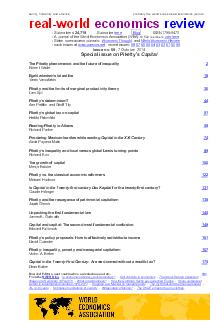World Economics Association (WEA) Real-World Economics Review, Issue no. 69, 07 October 2014 Special Issue on Piketty’s Capital.
Economists and other social scientists tend to study “problems”. Issues not studied tend to be seen as “natural”. “Poverty” and the “poor” are problems, the subject of a vast social science literature. Inequality, income concentration, the behaviour and influence of the super-rich tend to be treated as part of the natural order of things, warranting no more than marginal social science attention. We have a “poor economics” but no “rich economics”.
Mainstream economists have tended to emphasise the need for inequality as a source of incentives for effort and creativity, from which the whole society benefits; and to agree that higher taxes on the rich and increased aid to the poor are likely to hurt economic growth. Willem Buiter, former professor of European economics at the London School of Economics and currently chief economist, Citigroup, succinctly expressed a common nonchalance: “Poverty bothers me. Inequality does not. I just don’t care” (2007). The Nobel Prize economist Robert Lucas was more aggressive: “Of the tendencies that are harmful to sound economics, the most seductive, and in my opinion, the most poisonous, is to focus on questions of distribution” (2004). Earlier the famous neoliberal economist Ludwig von Mises declared his love for the anti-egalitarian, anti-democratic message of Ayn Rand’s Atlas Shrugged. He wrote to Rand in 1958, “You have the courage to tell the masses what no politician told them: you are inferior and all the improvements in your conditions which you simply take for granted you owe to the efforts of men who are better than you” (in Frank, 2012: 147).
Σχετικές αναρτήσεις:
- Nolan, B., Salverda, W., Checchi, D., Marx, I., McKnight, A., György Tóth, I. & van de Werfhorst, G. H. (Eds.) (2014) “The GINI Project, Changing Inequalities and Societal Impacts in Rich Countries – Thirty Countries’ Experiences“, Project Funded Under the Socio-Economic Sciences & Humanities Theme, 30 Αυγούστου.
- Krusell, P. & Smith, T. (2014) “Is Piketty’s ‘Second Law of Capitalism’ fundamental?“, VoxEU Organisation, 01 Ιουνίου.
- Το φαινόμενο Piketty: λίγα λόγια για τη θυελλώδη συζήτηση, 01 Ιουνίου, Παρατηρητήριο για την Κρίση.




